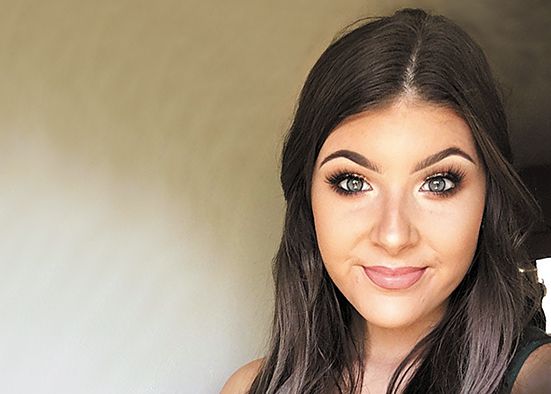One thing that was said to me and was quite personally upsetting was, ‘Is that a wig?’
One thing that was said to me and was quite personally upsetting was, ‘Is that a wig?’
15 November 2023

A YOUNG Downpatrick woman who was diagnosed with Hodgkin Lymphoma at just 20 years of age, is backing a new Teenage Cancer Trust campaign.
Amy Curran is joining young people across the UK to share the most uncomfortable and insensitive things people have said to them during cancer treatment as part of its new ‘What Not to Say’ campaign.
Amy, who is now 23, is appealing for people to take a moment to think before they speak to avoid unnecessary upset.
The campaign also aims to improve the lives of others by sharing tips about the most helpful things that people said or did to help them through treatment on the charity’s website.
The Teenage Cancer Trust provides expert nursing care and support to those aged 13-24.
The Trust put a call out to young people to contribute their experiences earlier this year.
As part of the campaign, Amy has shared how comments about her hair loss and wig had an impact.
“One thing that was said to me and was quite personally upsetting was, ‘Is that a wig?’, or, ‘Has your own hair grown back yet?’,” she said.
“For most people going through treatment losing hair is an extremely distressing side effect.
“I have even experienced people saying, ‘Take your wig off and let us see what length your real hair is’.
“My advice would be, just don’t mention it unless the person wearing a wig mentions it to you.
“It’s hard enough dealing with having no control of what side effects your treatment may be causing without having to worry about the extra pressure of your appearance.”
Amy has also shared how the ‘fighting talk’ around cancer can be difficult to deal with.
“Another thing I found unhelpful was people saying, ‘You’re such a hero/warrior’, or referring to cancer as a ‘battle/fight’,” she said.
“I understand this is usually coming from a good place and people are only respecting how much difficulty you have faced, but I think that most people with cancer don’t want to be hailed as heroes as we are not doing this voluntarily – we have no option.”
The negative experience shared by Amy and others supported by the Teenage Cancer Trust have been grouped into five main areas to avoid when talking to someone with cancer.
The first area is to not tell people suffering from cancer about other people’s relatives or pets that have died from cancer – or ask when they’re going to die.
Many said comments like this are noted to be deeply upsetting and unhelpful.
The second area to avoid, is speculating why someone got cancer. Some people had felt blamed by others for getting cancer because of their lifestyle, such as something they ate.
People should also avoid talking about people’s wigs and how the persons appearance has changed, whether it is loss of hair or noticeable weight loss.
The Trust also wants to encourage others not to tell people living with cancer that they are brave. Sufferers have cited that they did not feel brave and that treatment was just something they had no choice but to go through.
The Trust also stresses the importance of staying in touch with people living with cancer. Some sufferers found that friends ceased contact and disappeared during their treatment, most likely caused by awkwardness and not knowing what to say, but stressed that it’s important people stay in touch so sufferers do not feel isolated.
“A good thing to say to someone you know going through treatment may be, ‘If you ever feel like talking, I am here to listen’,” said Amy.
“They may not necessarily want to talk about treatment but I found it nice to sometimes just talk about anything and everything just to take my mind off treatment for a while.”
Amy added: “Try and treat the person the same way as you did before and not let cancer to get in the way of your friendships or relationships.
“I personally tried to maintain as much normality as possible during my treatment and found that this was something that really helped me.
“I couldn’t necessarily meet up with friends but would video call and text them often and they would keep me up to date with things that were going on in work or in each other’s lives.”
Amy was treated at the Ulster Hospital in Dundonald and was helped by Lisa, a Teenage Cancer Trust Clinical Nurse specialist, one of two nurses in Northern Ireland funded by the charity who are specially trained to support young people.
For more information on the Teenage Cancer Trust, visit their website, www.teenagecancertrust.org/say.


